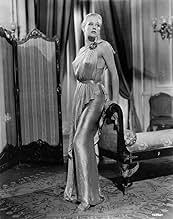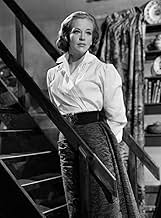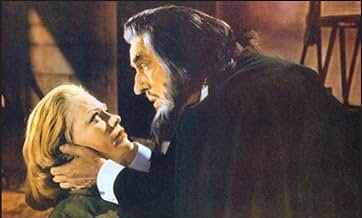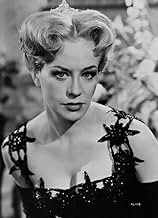Ajouter une intrigue dans votre langueThe story of a genius who hypnotizes an artist's model into becoming a great concert singer, and how she escapes from his influence only by his death.The story of a genius who hypnotizes an artist's model into becoming a great concert singer, and how she escapes from his influence only by his death.The story of a genius who hypnotizes an artist's model into becoming a great concert singer, and how she escapes from his influence only by his death.
- Réalisation
- Scénario
- Casting principal
- Nomination aux 1 BAFTA Award
- 1 nomination au total
Hildegard Knef
- Trilby
- (as Hildegarde Neff)
Avis à la une
Several masterpieces have been transformed because the female lead became pregnant. A less select band emerged quite differently because the director or one of the actors fell off the wagon while the film was being made (Derek Bond, who here plays The Laird, was himself himself summoned a few years later to replace Dennis Price when he showed up legless at the start of shooting 'Wonderful Life'). Robert Newton's replacement in the title role by Donald Wolfit probably made the film duller, but Wolfit was far scarier than the charming old soak would have been.
Since Frederick Pusey's sets were based on the wise decision to base the look of the film on the original engravings (which accounts for all the authentically Victorian whiskers worn by most of the men and the false nose worn by Wolfit) it's a handsome film. Even more handsome is Hildegarde Neff (as she then was) as Trilby; who sportingly sang badly until transformed both by Svengali and the substitution of Elizabeth Schwarzkopf's voice on the soundtrack.
But just as she was too human to be convincing a couple of years earlier in the title role of 'Alraune' (in which she was created by Erich von Stroheim, no less), big strapping Knef is too robust to make a convincing Trilby.
Since Frederick Pusey's sets were based on the wise decision to base the look of the film on the original engravings (which accounts for all the authentically Victorian whiskers worn by most of the men and the false nose worn by Wolfit) it's a handsome film. Even more handsome is Hildegarde Neff (as she then was) as Trilby; who sportingly sang badly until transformed both by Svengali and the substitution of Elizabeth Schwarzkopf's voice on the soundtrack.
But just as she was too human to be convincing a couple of years earlier in the title role of 'Alraune' (in which she was created by Erich von Stroheim, no less), big strapping Knef is too robust to make a convincing Trilby.
Donald Wolfit gets my vote as Best Animated Cartoon character of 1955. He cracks his fingers before 'playing' the piano, just like Bugs Bunny!
I think this Svengali dies of overacting.
There is a special bonus in this film: an uncredited (and very young) Jeremy Brett appears as a very happy art student in two sequences. He has a few lines and some nice closeups, and even gets to sing along with Harry Secombe on "Alice Where Art Thou". A curious concept.
Hildegarde Knef is very beautiful and the film is nicely art directed, except when she wears the Dior gowns. And the 'art' is pure Fifties kitsch. Some of the dialogue is so hilarious you will be yelling along with it, ROCKY HORROR-SHOW style.
I think this Svengali dies of overacting.
There is a special bonus in this film: an uncredited (and very young) Jeremy Brett appears as a very happy art student in two sequences. He has a few lines and some nice closeups, and even gets to sing along with Harry Secombe on "Alice Where Art Thou". A curious concept.
Hildegarde Knef is very beautiful and the film is nicely art directed, except when she wears the Dior gowns. And the 'art' is pure Fifties kitsch. Some of the dialogue is so hilarious you will be yelling along with it, ROCKY HORROR-SHOW style.
SVENGALI is a British-made version of the classic story about the evil hypnotist who creates a famous singer out of a young and untalented girl. In essence this tale is Rasputin in the music world, and it's quite a fun and eventful storyline.
The main reason to enjoy this film is the performance of Donald Wolfit (BLOOD OF THE VAMPIRE) in the title role. He seems to be channelling Bela Lugosi in both look and voice throughout the movie, and his hammy style of acting is a lot of fun; the other actors in the production feel flat by comparison.
The film as a whole isn't perfect - there's a little too much sappy romance going on, and events are never as exciting or dramatic as the producers would hope for - but the lush colours and costumes of the mid 1950s give this the look and feel of an early Hammer Horror outing. Hildegard Knef (later of Hammer's THE LOST CONTINENT) is fine as the youthful protégé, and it's fun to see Terence Morgan (CURSE OF THE MUMMY'S TOMB) before he got typecast as the bad guy.
The main reason to enjoy this film is the performance of Donald Wolfit (BLOOD OF THE VAMPIRE) in the title role. He seems to be channelling Bela Lugosi in both look and voice throughout the movie, and his hammy style of acting is a lot of fun; the other actors in the production feel flat by comparison.
The film as a whole isn't perfect - there's a little too much sappy romance going on, and events are never as exciting or dramatic as the producers would hope for - but the lush colours and costumes of the mid 1950s give this the look and feel of an early Hammer Horror outing. Hildegard Knef (later of Hammer's THE LOST CONTINENT) is fine as the youthful protégé, and it's fun to see Terence Morgan (CURSE OF THE MUMMY'S TOMB) before he got typecast as the bad guy.
Apparently this is the tenth(!) screen version of George Du Maurier's "Trilby" but only the second one I have watched myself thus far – the other being the classic 1931 John Barrymore version from Warner Brothers entitled SVENGALI, of course. Presently, I will also be getting to the similarly-titled modernized TV version of 1983 starring Peter O'Toole and Jodie Foster but, for the record, there are two more adaptations I am most interested in, which are Maurice Tourneur's Silent original TRILBY (1915; which is available on DVD from Alpha!) and the "BBC Play Of The Month" TV version from 1976 with Alan Badel. Anyway, back to the version at hand: apart from the truly wretched copy I got saddled with (comprising constant combing and intermittent freezing issues!), I quite liked this handsomely-mounted and literate (if clearly stage-bound and clumsily edited) adaptation that benefits greatly from two excellent central performances: albeit a last-minute replacement for the ailing Robert Newton and clearly overweight for the role of the insufferable Svengali, Donald Wolfit's bizarrely effective combination of Bela Lugosi's looks and Frankie Howerd's voice earned him a nod at the British Film Awards; on the other hand, the overage but beautiful Hildegarde Neff is suitably moving as the innocently sensual gamine Trilby. The rest of the notable cast includes Terence Morgan (as Little Billy), David Kossoff (as Gecko), Noel Purcell (as Trilby's father), Michael Hordern (as Morgan's disapproving minister uncle) and, as starving Parisian painters, Alfie Bass, Harry Secombe and Michael Craig!
This is quite an unusual film in that certain scenes don't make a lot of sense - storylines are clumsily and swiftly manifested with no real development and thus there is no real tension when there needs to be, however, it is visually interesting and at times beautifully lit and shot with great and believable sets.
I'm not sure if the script or the editing is at fault but think that it's some of both in equal measure that leaves the viewer at times thinking "Why was that just said?" or "Why did that character just behave like that?" or "How much time has passed between the last scene and this scene?" or "Ok, so this now appears to be the main thread of the story, why was it so long in being made apparent and why was it developed so clumsily" etc. These questions arising really put in my mind the appalling (but awfully good fun) script, and (lack of) continuity of Tommy Wiseau's "The Room".
Apart from it's script and editing/continuity reminding me of "The Room" and the storyline being reminiscient of "The Red Shoes" - possessive control-freak older man, seeks to control young woman performing against the will of her lover, - "Svengali" also reminds me of another unusual film set in Paris and made in the 1950s called "Man On The Eiffel Tower". This film is also visually interesting and nicely art-directed but also suffers from (at times) an unintelligable script and very poor continuity.
The intention of "Svengali" is of course good but poor execution of basic story-telling damages the impact of the film substantially - but I still quite liked it!
Look out for the very young and beautiful, (uncredited - even though he has some lines), great Jeremy Brett in his first feature.
I'm not sure if the script or the editing is at fault but think that it's some of both in equal measure that leaves the viewer at times thinking "Why was that just said?" or "Why did that character just behave like that?" or "How much time has passed between the last scene and this scene?" or "Ok, so this now appears to be the main thread of the story, why was it so long in being made apparent and why was it developed so clumsily" etc. These questions arising really put in my mind the appalling (but awfully good fun) script, and (lack of) continuity of Tommy Wiseau's "The Room".
Apart from it's script and editing/continuity reminding me of "The Room" and the storyline being reminiscient of "The Red Shoes" - possessive control-freak older man, seeks to control young woman performing against the will of her lover, - "Svengali" also reminds me of another unusual film set in Paris and made in the 1950s called "Man On The Eiffel Tower". This film is also visually interesting and nicely art-directed but also suffers from (at times) an unintelligable script and very poor continuity.
The intention of "Svengali" is of course good but poor execution of basic story-telling damages the impact of the film substantially - but I still quite liked it!
Look out for the very young and beautiful, (uncredited - even though he has some lines), great Jeremy Brett in his first feature.
Le saviez-vous
- AnecdotesHildegard Knef's singing was dubbed by Elisabeth Schwarzkopf.
- Citations
Svengali: If you choose you can put all that nonsense behind you forever.
Trilby O'Farrall: And do what, starve?
Svengali: Not if you put your trust in me absolutely, not if you do exactly what I tell you to do.
- Crédits fousOpening credits prologue: Paris The Latin Quarter at the turn of the Century
- ConnexionsReferenced in Hilde (2009)
Meilleurs choix
Connectez-vous pour évaluer et suivre la liste de favoris afin de recevoir des recommandations personnalisées
Détails
- Date de sortie
- Pays d’origine
- Langue
- Aussi connu sous le nom de
- Sihirbazın İntikamı
- Lieux de tournage
- Nettlefold Studios, Walton-on-Thames, Surrey, Angleterre, Royaume-Uni(studio: filmed at)
- Société de production
- Voir plus de crédits d'entreprise sur IMDbPro
- Durée
- 1h 22min(82 min)
- Couleur
- Rapport de forme
- 1.37 : 1
Contribuer à cette page
Suggérer une modification ou ajouter du contenu manquant


































